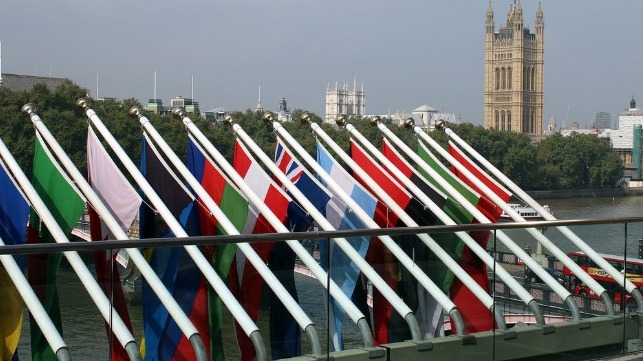MEPC 73 Expected to Approve Air Emissions Action

The IMO's next Marine Environment Protection Committee meeting (MEPC 73) is expected to advance governance of efforts to reduce greenhouse gas and SOx emissions. Chaired by Hideaki Saito of Japan, key agenda items include plans to tighten the Energy Efficiency Design Index (EEDI) and guidance for ship operators and flag states on the 2020 sulfur cap.
The meeting will be held October 22-26 and is expected to agree a program of action to implement the initial IMO strategy on reduction of GHG emissions from ships, which was adopted in April 2018. An Intersessional Working Group, meeting the week preceding MEPC 73, is expected to initiate this work.
The GHG strategy envisages a reduction in total GHG emissions from international shipping, which should peak as soon as possible. Total annual GHG emissions from international shipping should be reduced by at least 50 percent by 2050 compared to 2008. Concurrently, efforts should be pursued towards phasing them out entirely. Short-term measures could be finalized and agreed between 2018 and 2023; mid-term measures between 2023 and 2030; and long-term measures, beyond 2030.
Levels of ambition directing the initial strategy are:
1. New EEDI requirements for new ships. A correspondence group has submitted an interim report to MEPC 73 with a final report due to be submitted to MEPC 74 (Spring 2019), providing a recommendation on the time period and reduction rates for EEDI “phase 3” requirements.
2. A reduction in CO2 emissions per transport work, as an average across international shipping, by at least 40 percent by 2030, pursuing efforts towards 70 percent by 2050, compared to 2008.
3. GHG emissions from international shipping to peak and decline as soon as possible and to reduce the total annual GHG emissions by at least 50 percent by 2050 compared to 2008 whilst pursuing efforts towards phasing them out.
Feeding in to the process will be the data collection system on fuel oil consumption of ships over 5,000 gross tons, which begins on January 1, 2019 and a fourth IMO GHG study, to be initiated in the first half of 2019.
Implementation of 2020 sulfur cap
The new 0.50 percent limit on sulfur in ships’ fuel oil will be in force from January 1, 2020. MEPC 73 is expected to approve ship implementation planning guidance as well as best practice guides for States and for fuel oil suppliers. The ship planning guidance includes sections on:
• risk assessment and mitigation plan (impact of new fuels);
• fuel oil system modifications and tank cleaning (if needed);
• fuel oil capacity and segregation capability;
• procurement of compliant fuel;
• fuel oil changeover plan;
• documentation and reporting.
MEPC 73 is expected to adopt a MARPOL amendment which will prohibit the carriage of non-compliant fuel oil unless the ship has an exhaust gas cleaning system (scrubber) fitted.
Other Considerations
MEPC 73 is also expected to:
Consider a number of proposals to address the issue of marine plastic litter from shipping, in the context of 2030 Sustainable Development Goal 14 (SDG 14) on the oceans.
Approve Guidance on System Design Limitations of ballast water management systems and their monitoring, and to consider draft Guidance on validation of the compliance of individual systems with regulation D-2 of the BWM Convention in conjunction with their commissioning. The inclusion of contingency measures in the ballast water management plan will also be considered.
Consider, with a view to approval, an appropriate impact assessment methodology process for developing a ban on heavy fuel oil in Arctic waters.
Consider approving, for future adoption, draft amendments to MARPOL Annex II to strengthen, in specified sea areas, discharge requirements for tank washings containing persistent floating products such as certain vegetable oils and paraffin-like cargoes.
Adopt the draft 2018 Guidelines for the discharge of exhaust gas recirculation (EGR) bleed-off water.
Approve (for adoption in 2019) draft amendments to the International Code for the Construction and Equipment of Ships carrying Dangerous Chemicals in Bulk (IBC Code), including the draft revised chapters 17 (Summary of minimum requirements), 18 (List of products to which the code does not apply), 19 (Index of Products Carried in Bulk) and 21 (Criteria for assigning carriage requirements for products subject to the IBC Code).
Approve a draft MEPC circular on Guidelines for the carriage of energy-rich fuels and their blends.
Approve the draft part IV of the Guidelines for the use of dispersants for combating oil pollution at sea, which focuses on the sub-sea application of dispersant.
Approve, for subsequent adoption, draft Guidelines for the use of electronic record books under MARPOL and associated draft amendments to MARPOL and the NOX Technical Code.
